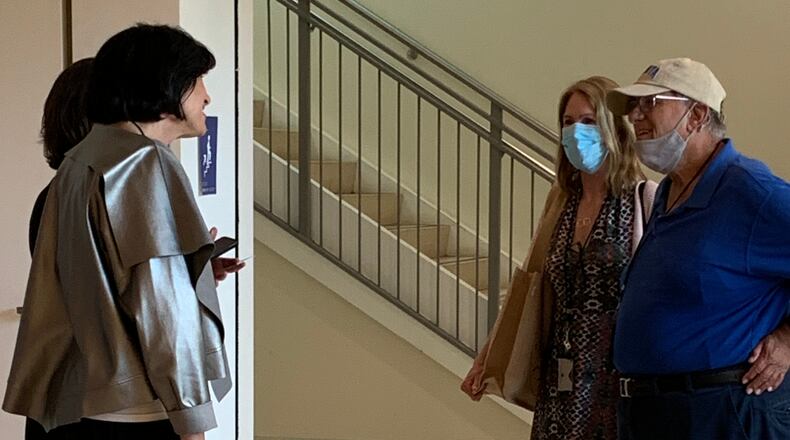On the last Wednesday in June, David Dressler woke up and did something he hadn’t done in more than 50 years.
He did not go to work.
Last week, Dressler, 75, retired as one of the longest-serving employees at the Centers for Disease Control and Prevention. On Tuesday, he gathered with friends — both current and former CDC employees — for a luncheon to celebrate a new chapter in his life.
It was a private moment of celebration for the agency, which has recently suffered very public criticism for its handling of the COVID-19 pandemic. A recent cover story in The New York Times Magazine proclaimed the 70-year-old institution “broken” and not just because of COVID-19. Foundational flaws that include volatile funding, territorial leaders and political forces have left the agency hamstrung in efforts to exert the little authority it has under its command.
“In an ideal world, its efforts would succeed, more often than not, at keeping people safe and helping them stay healthy. This is the C.D.C. we need. But as the last year has made clear, it is not the C.D.C. we have,” wrote the author.
But employees like Dressler, who make up the lifeblood of the organization and perform necessary if unheralded tasks, have learned over many years to stay focused on the long view. For those who know him, Dressler is a profound example of the agency’s core.
“The sense of caring about your job and doing it well, whether you are the smallest cog or the big cheese, that is a CDC kind of characteristic and it is embodied in David,” said Jane Thorpe, a retired attorney who has long ties with the CDC and has been a friend of Dressler’s for many years. “I believe in the CDC like I believe in the Constitution of our country. There are good people there who have been brought up with these core principles that David has.”
Credit: Image provided by CDC
Credit: Image provided by CDC
Dressler began working for the CDC in 1968 after attending Cross Keys High School and the Bobby Dodd Institute. He worked in materials handling, performing tasks ranging from routing shipments to different departments to sterilizing glassware from the labs. His father had also worked at the CDC, and Dressler quickly earned a reputation as a conscientious worker who brought his big personality and sense of humor to the job daily.
During the pandemic, Dressler continued working, and while some friends were concerned about his safety and well-being, he made clear his commitment to his job as an essential worker. “David was very proud of that,” said Thorpe. “He just said, ‘I have to go to work.’”
“He always had a smile on his face, was upbeat and ready to do anything,” said Don Powell, a program analyst for the CDC and a friend of Dressler’s.
Powell and Wayne Kirby, an engineering technician who retired from the CDC three years ago, got to know Dressler well during visits to Dressler’s home, where they would tinker with the TV or other electronics in need of repair.
On weekends, Dressler spent time indulging his interest in trains that developed years earlier when his father would take him to the train station as a young boy. Powell and Kirby brought him a scanner and programmed it so Dressler could hear the conductors on the trains and could tell when the trains were going to arrive, Kirby said.
Over the years, Dressler became a master of train watching and said he plans to spend a significant amount of time riding trains in Atlanta and taking his camera along to photograph them. “He has 1000s of pictures of trains, including old steam engines in the Atlanta area,” Kirby said.
Though he wishes more trains came by on the tracks near his home, which is not far from the CDC campus, Dressler said he’s willing to take long walks to make sure he sees as many trains as possible. “I have to stay in shape somehow,” he said.
Credit: Image provided by CDC
Credit: Image provided by CDC
When Dressler’s retirement was announced, Powell worried that the number of people who wanted to wish Dressler a farewell would overflow the 25-person capacity of the backroom at Matthews Cafeteria in Tucker.
“A lot of people over the years have interacted with David. He is family to them,” Powell said. “Everybody wants to look out for David the way he looked out for all of them.”
When the day arrived, Dressler enjoyed fried chicken for lunch as he was presented with cards and a model train from the many friends and co-workers in attendance.
“I couldn’t be prouder of him,” said Rachel Dressler, his younger sister who lives in upstate New York. “He is a remarkable man and I am so happy he had this long time at the CDC.”
Her biggest concern, she said, is that he remains safe and happy well into his retirement from the agency.
Powell said that one thing that he knows about the CDC is that it treats employees, current and former, like family. “We are not saying goodbye because we know David is family,” he said. “He is just moving on to have a little more time to watch his trains.”
You’ve likely never heard of David Dressler until this moment. He and countless others are not the public faces of the agency, but as some would say, they are the heart that keeps it beating.
“There are a lot of people in Atlanta connected to the CDC who are public health heroes who don’t get attention,” Thorpe said. “It takes the David Dresslers of the world to make that place operate.”
Read more on the Real Life blog (www.ajc.com/opinion/real-life-blog/) and find Nedra on Facebook (www.facebook.com/AJCRealLifeColumn) and Twitter (@nrhoneajc) or email her at nedra.rhone@ajc.com
About the Author
Keep Reading
The Latest
Featured






